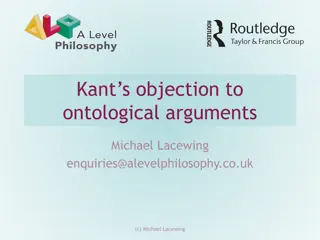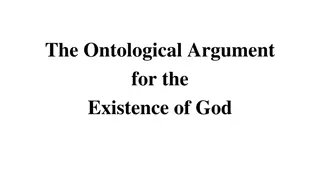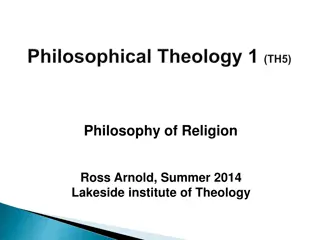
Anselm, Michel Foucault, and C.S. Lewis Through History
Explore the lives and thoughts of Anselm, Michel Foucault, and C.S. Lewis as they navigated different periods in history and posed profound questions about truth, morality, and God. Delve into Anselm's world with the church as protector, the rise of Islam, and C.S. Lewis's deep connection to books. Michel Foucault challenges objective truths and explores relative knowledge in different eras, shedding light on how people perceive reality.
Download Presentation

Please find below an Image/Link to download the presentation.
The content on the website is provided AS IS for your information and personal use only. It may not be sold, licensed, or shared on other websites without obtaining consent from the author. If you encounter any issues during the download, it is possible that the publisher has removed the file from their server.
You are allowed to download the files provided on this website for personal or commercial use, subject to the condition that they are used lawfully. All files are the property of their respective owners.
The content on the website is provided AS IS for your information and personal use only. It may not be sold, licensed, or shared on other websites without obtaining consent from the author.
E N D
Presentation Transcript
Anselm His World Came into a world where the church was seen as the protector of the religious and secular world. Leo I held back Attila the Hun Charlemagne was crowned by Leo III
Anselm Rise of Islam 6th Century: Islamic expansion west. Great literacy rate of Islamic community. Islam valued natural theology and science
Anselm Anselm s Life Born Northern Italy in 1033
Michel Foucault Believes periods of history have possessed specific underlying conditions of truth. What is crazy? What is immoral? What is joy? Who is God? What is beautiful? Foucault shows how people answer these questions for themselves. There are no objective answers, knowing is relative.
Michel Foucault Foucault is skeptical of ideas or realities which claim to exist for all people at all times. C.S. Lewis will become known as the Apostle to the Skeptics.
C.S. Lewis In 1905, at the age of seven, the family moved into a new home. The New House is almost a major character in my story. I am a product of long corridors, empty sunlit rooms, upstairs indoor silences, attics unexplored in solitude, distant noises of gurgling cisterns and pipes, and the noise of wind under the tiles. Also, of endless books.
C.S. Lewis My father bought all the books he read and never got rid of any of them. There were books in the study, books in the drawing room, books in the cloakroom, books (two deep) in the great bookcase on the landing, books in a bedroom, books piled as high as my shoulder in the cistern attic, books of all kinds
C.S. Lewis reflecting every transient stage of my parents interest, books readable and unreadable, books suitable for a child and books most emphatically not. Nothing was forbidden me. In the seemingly endless rainy afternoons I took volume after volume from the shelves. I had always the same certainty of finding a book that was new to me as a man who walks into a field has of finding a new blade of grass.
C.S. Lewis Lewis gravitated to not only reading but writing at an early age, due to a hereditary condition with his thumbs known as Symphalangism.
C.S. Lewis What drove me to write was the extreme manual clumsiness from which I have always suffered. I attribute it to a physical defect which my brother and I both inherit from our father; we have only one joint in the thumb. The upper joint (that furthest from the nail) is visible, but it is a mere sham; we cannot bend it. But whatever the cause, nature laid on me from birth an utter incapacity to make anything
C.S. Lewis With pencil and pen I was handy enough, and I can still tie as good a bow as ever lay on a man s collar; but with a tool or a bat or a gun, a sleeve link or a corkscrew, I have always been unteachable. It was this that forced me to write. I longed to make things, ships, houses, engines. Many sheets of cardboard and pairs of scissors I spoiled, only to turn from my hopeless failures in tears. As a last resource, I was driven to write stories instead.
C.S. Lewis Shortly after the death of his mother, in 1908, Lewis began to doubt many aspects of Christianity. There was in me a deeply ingrained pessimism; a pessimism, by that time, much more of intellect than of temper. I was now by no means unhappy; but I had very definitely formed the opinion that the universe was, in the main, a rather regrettable institution.
C.S. Lewis Lewis considered himself an atheist by the time he was fifteen. He resonated with Lucretius s atheistic argument: Had God designed the world, it would not be; A world so frail and faulty as we see.
C.S. Lewis I was at this time living, like so many Atheists or Antitheists, in a whirl of contradictions. I maintained that God did not exist. I was also very angry with God for not existing. I was equally angry with Him for creating a world.
C.S. Lewis Lewis began his academic career as an undergraduate student at Oxford; he excelled in every area he studied. He won a triple first, the highest honors in three areas of study.
C.S. Lewis While teaching at Oxford, Lewis continued writing prolifically. In 1929, an informal group of literary friends from Oxford began meeting together on Tuesday mornings. Lewis slowly re-embraced Christianity, influenced by arguments with Tolkien. He was also largely influenced by reading George MacDonald and G.K. Chesterton s The Everlasting Man.
C.S. Lewis You must picture me alone in that room night after night, feeling, whenever my mind lifted even for a second from my work, the steady, unrelenting approach of Him whom I so earnestly desired not to meet. That which I greatly feared had at last come upon me. In 1929 I gave in, and admitted that God was God, and knelt and prayed: perhaps, that night, the most dejected and reluctant convert in all England. I did not then see what is now the most shining and obvious thing; the Divine humility which will accept a convert even on such terms.
C.S. Lewis Between 1929 and 1963 (34 years) Lewis wrote approximately 58 literary works. Chronicles of Narnia and Mere Christianity being his most famous.
C.S. Lewis Lewis was married for the first time at age 59 to an American Joy Gresham. She had cancer and they were married beside her hospital bed. Her cancer went into remission allowing them to enjoy a couple years of normal married life before she died.
C.S. Lewis: Thoughts I call it Joy, which is here a technical term and must be sharply distinguished both from Happiness and from Pleasure. Joy (in my sense) has indeed one characteristic, and one only, in common with them; the fact that any one who has experienced it will want it again. Apart from that, and considered only in its quality, it might almost equally well be called a particular kind of unhappiness or grief
C.S. Lewis: Thoughts But then it is the kind we want. I doubt whether anyone who has tasted it would ever, if both were in his power, exchange it for all the pleasures in the world. But then Joy is never in our power and pleasure often is. Similar to hearing an amazing echo.
C.S. Lewis: Thoughts A man s physical hunger does not prove that that man will get any bread: he may die of starvation on a raft in the Atlantic. But surely a man s hunger does prove that he comes of a race which repairs its body by eating, and inhabits a world where eatable substances exist. In other words, If I find in myself a desire which no experience in this world can satisfy, the most probable explanation is that I was made for another world.
C.S. Lewis: Thoughts He was wrong to yearn for the echo. When he heard the echo it would be gone as soon as he recognized its arrival. His famous Surprised by Joy moment is the realization that the echo is not an end it has a source.
C.S. Lewis: Thoughts Lewis, with strong intellectual moorings, asks a society heading toward post- Christianity and relative post-Modernism if they possess Joy? Lewis spends his life wordsmithing his way from book to book directing people to Joy found only in Christ.
C.S. Lewis: Thoughts Don t seek whatever Joy works best for you There was no doubt that Joy was a desire but a desire is turned not to itself but to its object The form of the desired is in the desire. It is the object which makes the desire harsh or sweet, course or choice, high or low. It is the object that makes the desire itself desirable or hateful
C.S. Lewis: Thoughts I perceived (and this was a wonder of wonders) that just as I had been wrong in supposing that I really desired the Garden of the Hesperides, so also I have been equally wrong in supposing that I desired Joy itself. Joy itself, considered simply as an event in my own mind, turned out to be of no value at all. All the value lay in that of which Joy was the desiring. And that object, quite clearly, was no state of my own mind or body at all.
C.S. Lewis: Influence He sought to show how a Christian can be fully involved in their faith emotionally as well as intellectually. He did not try to prove the faith, in typical evidentialist ways, but he instead removed barriers to belief and helped those who were weak in faith to see that they could reasonably embrace Christ and remain intellectually honest.
C.S. Lewis: Foibles He doesn t believe in the inerrancy of Scripture, and defaults to logical arguments more naturally than to biblical exegesis. He doesn t treat the Reformation with respect, but thinks it could have been avoided, and calls aspects of it farcical. He steadfastly refused in public or in letters to explain why he was not a Roman Catholic but remained in the Church of England
C.S. Lewis: Foibles He makes room for at least some people to be saved through imperfect representations of Christ in other religions. He made a strong logical, but I think unbiblical, case for free will to explain why there is suffering in the world. He speaks of the atonement with reverence, but puts little significance on any of the explanations for how it actually saves sinners
C.S. Lewis: Foibles Piper writes, So, in spite of all Lewis s flaws, the most fundamental reason why he has been so influential in my life, and so awakening to my own soul, is that he remained anchored as a Christian in the unfathomable rock-solid objectivity of God and his Truth and his gospel as infinitely Beautiful and infinitely Desirable and, therefore, as the unshakeable ground of unutterable and exalted Joy.
C.S. Lewis: Foibles In his defense he says, Most of my books are evangelistic, addressed to tous exo [those outside]. . . When I began, Christianity came before the great mass of my unbelieving fellow-countrymen either in the highly emotional form offered by revivalists or in the unintelligible language of highly cultured clergymen. Most men were reached by neither. My task was therefore simply that of a translator one turning Christian doctrine, or what he believed to be such, into the vernacular , into language that unscholarly people would attend to and could understand. . . .
C.S. Lewis: Foibles . . . Dr. Pittenger would be a more helpful critic if he advised a cure as well as asserting many diseases. How does he himself do such work? What methods, and with what success, does he employ when he is trying to convert the great mass of storekeepers, lawyers, realtors, morticians, policemen and artisans who surround him in his own city?
C.S. Lewis: Foibles As we seek to reach the great mass of storekeepers, lawyers, realtors, morticians, policemen and artisans who surround us in our own city we are fools if we do not spend time sitting at the feet of C.S. Lewis. He is able to lecture at Oxford and Cambridge while writing stories for children. He is fully aware of the newest ideas, yet does not neglect the wisdom of the ages.




